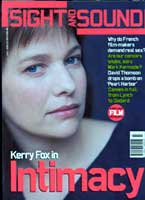
Sick Sisters

Is the violent Baise-moi an issue drama or pure exploitation, asks Linda Ruth Williams
One of the lesser pleasures of the porno-trainspotter is listing those wonderful titles the industry comes up with for its hardcore parodies of mainstream movies. My favourites include Shaving Ryan's Privates, The Sperminator, Forrest Hump and Saturday Night Beaver. One would have thought, then, that a film that's basically Thelma & Louise Get Laid could have invented a wittier moniker than the bald challenge Baise-moi (translated as Fuck Me or Kiss Me, though one of its titles is Rape Me). Forget sex-and-shopping as the epitome of female pleasure and the prime currency of women's fiction; here fucking-and-shooting is what women want.
Baise-moi has provoked shock-horror and serious debate in roughly equal measures in every country it's touched, though it's in essence nothing more outrageous than a bloody buddy/road movie. Hooker Nadine (Karen Bach) meets sex actress Manu (Raffaëla Anderson) by chance after both have had violent arguments with their partners, following the rape of Manu. It's a marriage made in exploitation-cinema heaven. The pair go on a sexual and murderous spree during which a variety of victims meet a variety of ends, sometimes after doing sexual service. Women die too, and unlike in such films as Michael Winner's adaptation of Helen Zahavi's novel Dirty Weekend, it's fairly arbitrary who gets slugged and who doesn't as the pair oscillate between 'devil may care' and 'he had it coming to him'. 'We'll follow our star,' says Manu, 'and let rip the motherfucker side of our soul.' The duo hole up in a series of hotel rooms, engage in predictable forms of scurrilous behaviour (drugs, theft, a generalised bad attitude) and do their ballsy best to resurrect those bad girls of 50s American B-movies for 21st-century European cinema. Whether the 90s girls-with-guns were meant to titillate or empower was never resolved; now Baise-moi marries the iconography of sexy female violence incarnated in Nikita or Blue Steel and Butterfly Kiss with hardcore to confuse the issue even further.
Crucially, Baise-moi itself is actually rather fun, and refreshingly innocent in its cinematic strategies (digital video without the Dogme hype; shaky but promising performances from two leads who hail from hardcore). If it's sensationally confused, it's also energetically driven. Nevertheless the questions it provokes, especially for British audiences, censors and promoters, are as familiar as the genre motifs it devours and regurgitates.
Issue 1: they're really doing it. No surprises here - Anderson and Bach, along with co-director Coralie Trinh Thi, are hardcore veterans branching out into more narrative-led drama. After the real-sex performances central to such arthouse fodder as Ai no corrida (1976), The Idiots (1998) and Romance (1999), we should no longer find this so remarkable. The true breakthrough will come (as John Waters famously said) when the first A-list Hollywood star does a real hardcore scene complete with shots of erections, oral sex and penetration. One assumes Hollywood isn't quite ready for a studio version of Baise-moi starring Julia Roberts and Cameron Diaz.
Issue 2: it's directed by a woman. Two women, in fact, one of whom - Virginie Despentes - wrote the book on which the film is based. Also directed by women are films as diverse as Triumph of the Will (Leni Riefenstahl), Meshes of the Afternoon (Maya Deren) and Wayne's World (Penelope Spheeris). And Romance (Catherine Breillat). Not to mention an increasing number of hardcore skinflicks and such interesting softcore trash as Poison Ivy (Katt Shea), Another 91/2 Weeks (Anne Goursaud) and Angel of Desire (Donna Deitch). We should have learned by now that gender is no index of auteurial authenticity. And it's certainly no guarantee that gender issues will be obediently and unilaterally represented in line with the director/writer's own sexuality and perspective. Whether this makes hardcore or violent material more or less acceptable is a question for the censors.
Issue 3: if it wasn't a French arthouse film it would never have got past the BBFC. This may be true, especially given the BBFC press release justifying Baise-moi's certification at '18', with one cut to the rape scene. But the film's release history elsewhere has been as troubled as its subject matter. Given a rare 'X' certificate after the French high court overturned the original 'PG-16' in the wake of a National Front-led campaign, it was then banned outright by a number of local authorities. In Canada it was banned by the Ontario Review Board following walkouts at a Toronto Film Festival screening, and a viewer at the Parisian Theatre in Montreal broke into the projection room, tore the film out of the projector and threatened to bomb the cinema. Ironically the BBFC decision may make Baise-moi's British reception its most liberal yet. The only problem the board claimed was the juxtaposition of extreme sexual images with violence, hence the cut of a penetration shot from the rape scene. Similar shots have been allowed in scenes of consensual sex, however, and the BBFC applauds the film for its 'serious cultural purpose'. Whether any old French exploitation flick is capable of making a miraculous metamorphosis into arthouse respectability the instant it crosses the channel is another question. Rather than asking how far those naughty French will go with their cinematic sex, we might be better off wondering why we're happy to believe almost any foreign-language material must be 'serious'.
So what has inspired the shocked responses? First, the rape scene - though even in its uncut form this is handled quite responsibly. 'We didn't invent rape,' Despentes has said in interview. 'I've been raped and one of my actresses has been raped... It's horrific, so I don't see why I shouldn't treat it that way.' The scene is extremely nasty; but it's not murder either. Manu survives, and while the rape may be seen as the catalyst for the revenge she takes, she also asserts - in line with some recent feminist writings - that rape is not the worst thing that can happen to a woman. 'We're still alive, right?' says Manu to the other rape victim. 'If you park in the projects, you empty your car 'cause someone's going to break in. I leave nothing precious in my cunt for those jerks. It's just a bit of cock.' While promoting a particular line on sexual violence and giving a dimension to Manu's anomie, the rape is also a narrative device, motivating the subsequent violent action. It is the survivability as well as the trauma of rape which fuel the rape-revenge film.
More shocking to me was the bad girls' violent response to the nerdy jerk who tries to don a condom. But while the vast majority of mainstream sex scenes don't even mention safer sex, at least the issue is raised here. Of course girls gone as wrong as these antiheroines are bound to take irresponsibility to an extreme of glorious wickedness; anyone hurtling downhill this fast wouldn't care less about germs picked up and passed on. Having dribbled a pool of menstrual blood into the hotel bath to show how bad they are ('I used to stain everything to piss my mom off,' says Manu. 'Shit, it makes me wanna fuck!'), the girls hit town searching for a victim and a justification. Here unsafe sex becomes another weapon in the armoury of the (literally) femme fatale. Foolish is the man who fumbles over his condom when these women have something far more violent and immediate in store than a lingering STD. I must admit I laughed out loud at the speech where Manu explains to her victim exactly what he's let himself in for: 'What we don't like about you, buddy, is the condom. We know who you are - a condom dickhead. You don't follow strange girls like that. Know who you've landed up with this time, pal? The fucking condom-dickhead killers!' Do I find this funny because I too am an irresponsible man-hater ready to stamp on the next guy who thinks he's got the measure of me, just to prove he hasn't? Let's give some credit for audacity here. Pick up women who care this little and you can't afford to care about what you in turn will pick up from them. Or go home to your wife.
So is Baise-moi a women's film? Since women found such mainstream movies as Ridley Scott's Thelma & Louise (1991) exhilarating exercises in wish-fulfilment, surely Baise-moi has equal potential as fantasy fodder? Like when a guy on the street propositions Nadine with the charming line 'Wanna feel my balls slapping your ass?' only to be executed without a moment's hesitation by her best mate. This seems not a million miles from Louise's trigger-happy revenge of Thelma's near-rape or the moment when the pair blow up the lecherous truck driver's tanker.
Of course Baise-moi knows this all too well: the film's punk ethic is laced with a cineliteracy that makes it easy for viewers to place it in the context of its predecessors. Having kicked the poor 'condom dickhead' to death, the women complete the tableau of violence with one of exploitation cinema's defining images, as Nadine (shot at floor level) presents to the camera her gore-encrusted black stiletto shoe, poised in a pool of blood. And as death and the final reel beckon, the gestures towards other films point us to the inevitable: shacked up with a couple who take the girls under their wing, Nadine laments the loss of the 'home we'll never have', like Bonnie Parker meeting her mother for the last time in Bonnie and Clyde (1967); the girls' fantasy of ending it all by 'jumping without a bungee' explicitly evokes Thelma & Louise. More complex is the link to exploitation cinema via its 90s postmodern reincarnation. Holding up a gun shop, Nadine wears a sharp, plunging black suit and a sleek, dark bobbed wig à la Uma Thurman in Pulp Fiction; having shot to pieces the various cavorting members of a fuck club, Manu makes a man get on all fours and grunt, recalling both the infamous 'squeal like a pig' scene in John Boorman's Deliverance (1972) and its parody in Tarantino's film.
None of this justifies violent representations on the grounds that they are cinematic rather than realistic, but it does at least show that Baise-moi knows what game it's playing. Shock is its objective and sensationalism its medium. Many a horror film has striven to up the ante in the gross extremes it can bring to the screen; that this is neither a horror film nor a porn film may be part of the problem. Shooting a man on all fours through his rectum so the blood splatters out of his mouth is no more gross than many a death in a horror movie. What's unusual is the conjunction of real sex and unreal violence, the confusion of authenticated pornographic fantasy and simulated violent spectacle.
In what is perhaps the film's final comment on the trashiness of its own screenplay, Despentes has her heroines lament their lack of Tarantinoesque wit: 'Fuck, we're useless,' says Manu. 'Where are the witty lines?... I mean, people are dying. The dialogue has to be up to it.' Earlier Nadine has sex with a client while French cinema's last big scandal, Gaspar Noé's Seul contre tous (1998), plays on a television screen in front of them. Is this to say that watching Seul contre tous drove these women to it, or that Baise-moi consciously sees itself as the next moment in a progression? We're about to witness the next instalment in the British public's love-hate relationship with European exploitation cinema. Hold tight for the tabloid furore.
